|
|
|
Sort Order |
|
|
|
Items / Page
|
|
|
|
|
|
|
| Srl | Item |
| 1 |
ID:
132889
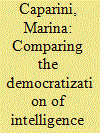

|
|
|
|
|
| Publication |
2014.
|
| Summary/Abstract |
This article discusses the reform of intelligence governance in two sub-regional groupings of former communist states: East Central Europe and the Balkans. These two sub-regions are delineated according to the pace and nature of transformations that they have undergone since the collapse of communist rule and their relations with respect to the European Union, the key political and economic organization in Europe. A number of lessons are drawn from comparing experiences in the two sub-regions relating to democratic reform of the security apparatus, and in particular the intelligence sector. Significant factors in the consolidation of democratic governance of intelligence include the nature of precursor communist-era regimes and the legacies they created, whether armed conflict has occurred during the transition, the extent and character of external (especially EU) assistance, and the strength of media and civil society. These factors appear to have influenced how transitional regimes have sought to introduce institutional reforms to constrain the powers of those services and their susceptibility to arbitrary use. They also have influenced measures taken to redress abuses by intelligence services under the preceding communist regime and the legitimation of the post-authoritarian state.
|
|
|
|
|
|
|
|
|
|
|
|
|
|
|
|
| 2 |
ID:
029381
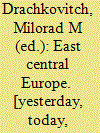

|
|
|
|
|
| Publication |
Stanford, Hoover Institution Press, 1982.
|
| Description |
xi, 417p.Hbk
|
| Standard Number |
0817974012
|
|
|
|
|
|
|
|
|
|
|
|
Copies: C:1/I:0,R:0,Q:0
Circulation
| Accession# | Call# | Current Location | Status | Policy | Location |
| 021098 | 940.55/EAS 021098 | Main | On Shelf | General | |
|
|
|
|
| 3 |
ID:
107056


|
|
|
|
|
| Publication |
2011.
|
| Summary/Abstract |
This article compares the rates of intercountry adoption from 26 sending countries of the former Soviet Union and East Central Europe to 25 receiving countries during the period 2000-2006. While our data confirm that countries adopting foreign children have significantly higher incomes than those from which they adopt, they show no significant discrepancy in birth rates between the two groups, with some sending countries actually having lower birth rates than their corresponding receiving countries. We then suggest that high sending rates result, not from a large 'surplus' of children, but from institutions that can connect the sending countries' 'surplus' children with prospective parents in receiving countries, and that the legacies of communist rule include such institutions.
|
|
|
|
|
|
|
|
|
|
|
|
|
|
|
|
| 4 |
ID:
095089
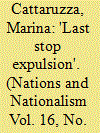

|
|
|
|
|
| Publication |
2010.
|
| Summary/Abstract |
This article deals with the European minorities in the period between the two world wars and with their final expulsion from nation-states at the end of World War II. First, the tensions which arose between the organised minorities and the successor states of the Habsburg Monarchy are accounted for primarily by the argument that the various minorities located within the successor states had already undergone a comprehensive processes of nationalisation within the Habsburg Empire. Therefore they were able to resist assimilation by the political elites of the new titular nations (Czechs, Poles, Rumanians, Serbs). A second topic is that of the use made of the minorities issue by Adolf Hitler to help achieve his expansionist aims. The minorities issue was central to the international destabilisation of interwar Europe. Finally, the mass expulsion of minorities (above all, Germans) after the end of the war is explained by strategic considerations on the part of the Allied powers as well as involving the nation-state regimes. It is argued, against a commonly held view, that German atrocities during the period of occupation had little to do with the decision to expel most ethnic Germans from their territories of settlement in Poland, Czechoslovakia and Yugoslavia. The article shows that it is necessary to treat national minorities in the first half of the twentieth century as a single phenomenon which shares similar features across the various nation-states of East-Central Europe.
|
|
|
|
|
|
|
|
|
|
|
|
|
|
|
|
| 5 |
ID:
122819
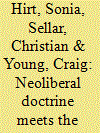

|
|
|
|
|
| Publication |
2013.
|
| Summary/Abstract |
THIS COLLECTION EXPLORES HOW NEOLIBERAL IDEOLOGY-and related economic policies-have been implemented in the once-socialist countries of East Central Europe and the former Soviet Union. Specifically, it argues that this ideology undergoes deep modifications as it meets post-socialist conditions: sometimes it is creatively appropriated, sometimes resisted and sometimes 'purified' (in that it is implemented more thoroughly than in the Western nations where neoliberalism as an ideology was developed). Thus, the collection illustrates how 'actually existing neoliberalism', to use Brenner and Theodore's (2002) terminology, occurs 'on the ground'. It argues that the 'actually existing neoliberalisms', which have developed in a variety of post-socialist contexts, can differ profoundly from the theoretical constructs propagated by neoliberalism's supporters, including the major international financial institutions such as the International Monetary Fund and the World Bank. As recent literature on policy mobility makes clear 'It is already widely recognized that it is rarely possible to transfer policies directly, precisely because they emerge from and are responses to particular "local" sets of social and political conditions which are not replicated in the places to which they are transplanted' (Cochrane & Ward 2012, p. 5).
|
|
|
|
|
|
|
|
|
|
|
|
|
|
|
|
| 6 |
ID:
120041
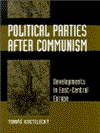

|
|
|
|
|
| Publication |
Washington DC, Woodrow Wilson Center Press, 2002.
|
| Description |
xvii,213p.hbk
|
| Standard Number |
0801868513
|
|
|
|
|
|
|
|
|
|
|
|
Copies: C:1/I:0,R:0,Q:0
Circulation
| Accession# | Call# | Current Location | Status | Policy | Location |
| 057208 | 324.20943091717/KOS 057208 | Main | On Shelf | General | |
|
|
|
|
| 7 |
ID:
108012


|
|
|
| 8 |
ID:
103798
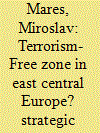

|
|
|
|
|
| Publication |
2011.
|
| Summary/Abstract |
The aim of this article is to analyse terrorism and the phenomena linked to it in East Central Europe. In comparison with a number of other regions of today's world, this area can currently seem to be a relatively "terrorism-free zone." Although the number of terrorist attacks committed in this territory is insignificant, this does not mean that the risk of terrorism is entirely negligible in the region. This text explains some historical determinants of the current situation and describes the consequences both of regime change in the countries in question and of their foreign policy decisions after 1989. I also analyse the importance of East Central Europe as a logistical space for international terrorism (weapons procurement, stays of terrorists, etc.). I characterise the threats of Islamic and Middle Eastern terrorism in connection with the pro-American and pro-Israeli policies of East Central European countries, especially after 9/11, assess the risks posed by the domestic extremist scenes in those countries that have a relationship with terrorism, and take notice of the accusations of terrorism that have been voiced in international politics. On the basis of this data, I then provide an overview of the importance of East Central Europe for the contemporary study of terrorism.
|
|
|
|
|
|
|
|
|
|
|
|
|
|
|
|
| 9 |
ID:
089198
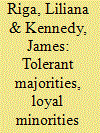

|
|
|
|
|
| Publication |
2009.
|
| Summary/Abstract |
The 1919 Versailles Peace Conference created new states in East Central Europe (ECE), but the imperfect implementation of the 'one nation, one state' formula resulted in more than twenty-five million 'unassimilable' minorities. With the introduction of majoritarian democracy, this gave rise to what we term 'ethnic reversals': 'formally dominant majorities' suffered status decline, while previously 'minoritised majorities' found new political powers. Accordingly, the 1919 Minorities Treaties sought to manage these 'ethnic reversals' by instituting a liberal minority rights regime that tried to create both 'tolerant majorities' and 'loyal minorities'. While the Treaties reflected the influences of Anglo-American and Anglo-American Jewish elites - the most notable voices of liberalism in an age of ethnic homogenisation - we suggest that in contexts of historical diversity with little institutionalised liberalism, 'ethnic reversals' raise issues that cannot be resolved within liberal conceptions of minority rights that rely solely or primarily on cultural protections.
|
|
|
|
|
|
|
|
|
|
|
|
|
|
|
|
| 10 |
ID:
110024
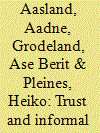

|
|
|
|
|
| Publication |
2012.
|
| Summary/Abstract |
The article examines patterns of generalised and institutional trust among elites in East Central Europe, South East Europe and the West Balkans. It enquires into the extent to which such trust can predict elite perceptions and behaviour concerning informal practice. The article builds on surveys of elite representatives in seven post-socialist states. Survey findings are complemented with and illustrated by findings from qualitative in-depth interviews. It emerges that neither institutional nor generalised trust can serve as strong predictors of informal behaviour or of informal practice. The linkages between trust and informal practice are then discussed with reference to elites' own experiences with the past legacy and post-socialist society.
|
|
|
|
|
|
|
|
|
|
|
|
|
|
|
|
| 11 |
ID:
105894
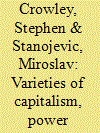

|
|
|
|
|
| Publication |
2011.
|
| Summary/Abstract |
Although Slovenia is a small, relatively new nation-state, it has been justifiably called "neocorporatist" and a "coordinated market economy," making it unique among postcommunist societies, including ten new EU member states. The authors explore how it became so, and in the process shed light on the debate between varieties of capitalism (VoC) and power resources theories about how coordinated or neocorporatist economies emerge. Although several of the elements predicted by the varieties of capitalism perspective were present in Slovenia, others were not. The authors also find that a significant mobilization by organized labor at a crucial point played an essential role, and overall find that power resources theory has greater explanatory power in this case. However, in turning from explaining how the Slovenian model was formed to why it was so unique among postcommunist cases, they find that specific historical legacies were critical, particularly those from the distinct Yugoslav form of communism.
|
|
|
|
|
|
|
|
|
|
|
|
|
|
|
|
| 12 |
ID:
095099
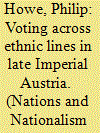

|
|
|
|
|
| Publication |
2010.
|
| Summary/Abstract |
The Austrian party system, following the introduction of universal manhood suffrage in 1907, has conventionally been characterised as being divided along ethno-national lines, reinforcing perceptions that politics within the Habsburg Empire was overwhelmingly driven by nationalism. However, the electoral results in a number of districts only make sense if one assumes that voters cast ballots for their alleged ethnic opponents. A systematic analysis of election results, utilising a simple process of elimination and drawing on the highly detailed statistical records available, strongly suggests that such voting was commonplace. Furthermore, alternative explanations based on differential voting qualification rates, errors in the census, and electoral fraud do not withstand close scrutiny. One must therefore conclude that although ethnic conflict did occur, it was paralleled by inter-ethnic bargaining and compromise, thereby supporting more positive appraisals of Austrian electoral and parliamentary politics and of representative political institutions in ethnically divided societies.
|
|
|
|
|
|
|
|
|
|
|
|
|
|
|
|
|
|
|
|
|